Ginger Rogers: “Oh, don’t leave me. I won’t know how to talk to these people.”
David Niven: “Just say ‘no’ to the men, the girls won’t probably talk to you anyway.”
Here’s the perfect film for New Year’s Eve. It’s Bachelor Mother (1939) starring David Niven and Ginger Rogers, produced by RKO Radio Pictures. Ginger’s a brassy shopgirl, working in the toy department at Merlin’s department store in Manhattan, selling wind-up Donald Ducks. David Niven’s the playboy heir to the Merlin fortune. And in the topsy-turvy tradition of Twelfth Night, there’s a mix-up over an orphaned baby dumped on the steps of the Foundling Hospital — a case of mistaken identity.
There's something very 1930s about a slick department store. An old-fashioned concept relegated by online shopping to the late 19th and early-to-mid 20th century — for the department store was the Edwardian equivalent of Amazon. Gimbels was founded in 1842, Macy's in 1858, Bloomingdales in 1861 and Saks in 1898. Over here, many of our once famous department stores have surprisingly early foundations: Debenham & Freebody in 1778, Swan & Edgar in 1812, Dickins & Jones in 1835, Derry & Toms in 1860, Harrods in 1849, Barker's of Kensington in 1870 and Selfridge's in 1908. In Cheltenham, there was even Cavendish House (1823), 'The Harrods of Cheltenham', with a fascia above the door, in green and gold and the name emblazoned in the Harrods font.
Like the great Edwardian hotels or the ocean liners, the department stores ran 'Bristol Fashion', as if by clockwork, with precision and efficiency: a time when Harrods had its very own bank (with a marble foyer) and a smart cheque book (with a swirly font) and a pet department which claimed to sell elephants. Even as late as the 90s, the manager of the Harrods clock department wore a red carnation in his buttonhole. I have no idea if this is still the case — somehow, I suspect not — as Harrods hasn't been graced with my presence for several years now, and on my last visit, lost in a maze of aggressive branding, scented corridors and ersatz Egyptology, and stopped by a doorman for being ‘improperly dressed’, (it takes one to know one), I was out of there before one could say ‘customer service'.
Anyway. Bachelor Mother. There's a lovely chemistry between Rogers and Niven, like a newly married couple, the gentle bickering over their haphazard attempt at parenting. Ginger's great. And in the middle of the film, we get the chance to see her strut her stuff in one of those slightly disturbing 1930s dance contests popular during the American Depression, competitions attracting the seriously impoverished and hard-up; you know, ‘dance until you drop’. David Niven is terrific too — in rakish bowler and double breasted overcoat — as he almost always is, and actually thinking about it, this might be one of his best performances. My only quibble (and it's not really a quibble) is that Nivs, with his pukka Englishness, makes an unlikely heir to an American department store Empire, altho’ I suppose his martinet father might have sent him to 'Oggsford, England'. The other snag is that Niven is just too sympathetic. David Merlin is, I think, supposed to be some sort of a wastral, dissolute playboy, but, instead, comes across as a rather competent, efficient managerial Numero Two. Niven was, after all, a brave and professional career soldier: in the Highland Light Infantry, later the Rifle Brigade, promoted to substantive Lieutenant Colonel, then transferring to the Commandos. During the Battle of the Bulge in 1944, Lt. Colonel David Niven was stopped at a security roadblock by American Military Police and asked who won the World Series in 1940. Niven replied, "I haven't the faintest idea, but I do know that I made a picture with Ginger Rogers in 1938."
I adore David Niven. There’s a sensitivity (even vulnerability) about Niven which makes him so likeable — and, actually, rather interesting. Underneath the elegance and the throwaway, flippant charm. There’s the famous Michael Parkinson interview from 1975, which I’ve posted below. Alas, I’m never entirely convinced by Parkinson (and please do correct me if you think I’m being unfair) but he can come across as a trifle patronising — with his pumped up BBC audience — in that rather Yorkshire way: nothing annoyed me more as a thirty something as being addressed as ‘sunshine’ or ‘young man’ — altho’ his guests are to die for, and Niven, despite the raconteur’s carefully reconstructed stories (which you need to take with a pinch of salt), comes across as nervous, complicated, and even rather insecure, fiddling with his cufflinks and co-ordinated orange tie.
But I've always thought that late 1930s/1940s America was a luxurious place in which to live — a beacon of civilisation — as long as you were rich, that is, moved in the right circles and lived on the East Coast. This is the world of Bringing up Baby (1938), Strangers on a Train (1951) and, of course, Bachelor Mother. For the British forget that Colefax and Fowler is, essentially, an Anglo-American hybrid, courtesy of Nancy Lancaster, a mid 20th-century reimagined 'English Country House' look improved by American luxury, comfort and practicality — like, er, a bathroom with hot, running water and soft, comfortable sofas in which to lounge.
I'm also interested in the idea of American service (and before we get too starry-eyed, based on a low-wage, high-tip economy), where, even today, an eager, smiley chap in one of those American paper hat things might pack your supermarket groceries in a large, brown paper bag and take it willingly to your shooting brake — compared to Britain, where at the impatient, grumpy checkout, they throw a miserable thin plastic (biodegradable?) bag in your face (which is impossible to open), can't even look you in the face and expect you to wrap it yourself. This is a world where David Niven’s David Merlin can dial up a fashionable frock by telephone, and it's delivered immediately (gift-wrapped in cardboard boxes) by uniformed, wise-cracking porters in uniform in caps with shiny peaks and piped uniforms.
Anyway. Watching Bachelor Mother again; after many years, it’s now suddenly catapulted into my all-time favourite film list. It’s a charming, delightful film, beautifully made and acted, and funny — with a subtle, witty script. A gem. And the baby’s cute. The inevitable denouement, set to Auld Lang Syne (Top Hats in Times Square), is genuinely moving (Oh, Big Softie That I Am) and has to be included in the all-time list of romantic screen snogs, worthy of Cinema Paradiso (1988) itself — altho’ God help the couple after the film has finished. I mean, they’re not exactly compatible. Which reminds me. I must add Cinema Paradiso to the film list for 2025.
I watched Bachelor Mother (1939) on a social media streaming service, although it’s also available on DVD — but for some reason copies seem to be rather expensive, even when found second-hand on eBay. But I am sure you will find your own way of seeing it.
Right. Time for a recap. It’s hard to believe but that was film recommendation No. 109. And you’ve just been reading the Sunday morning post for both ‘paid for’ and free subscribers. Join le gratin, become a ‘paid’ subscriber and you’ll get an extra, exclusive post on Friday mornings, plus further ‘bonus’ posts on High Days and Holy Days. Worth thinking about. I will be back on Wednesday with an extra post for New Year’s Day. We’ll have our own little post-mortem: the most popular film recommendation — so far — the films you liked the least (silent cinema and science fiction?) and my plans for 2025. I’ve created a cracking film list for the New Year, which I’m excited about and can’t wait to share with you. But more of that on Wednesday. Until then.

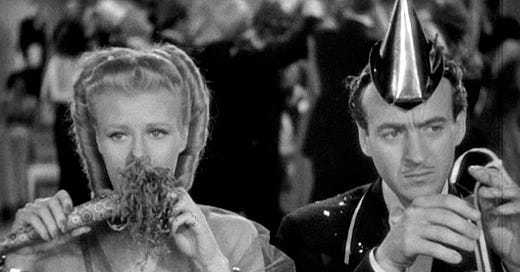



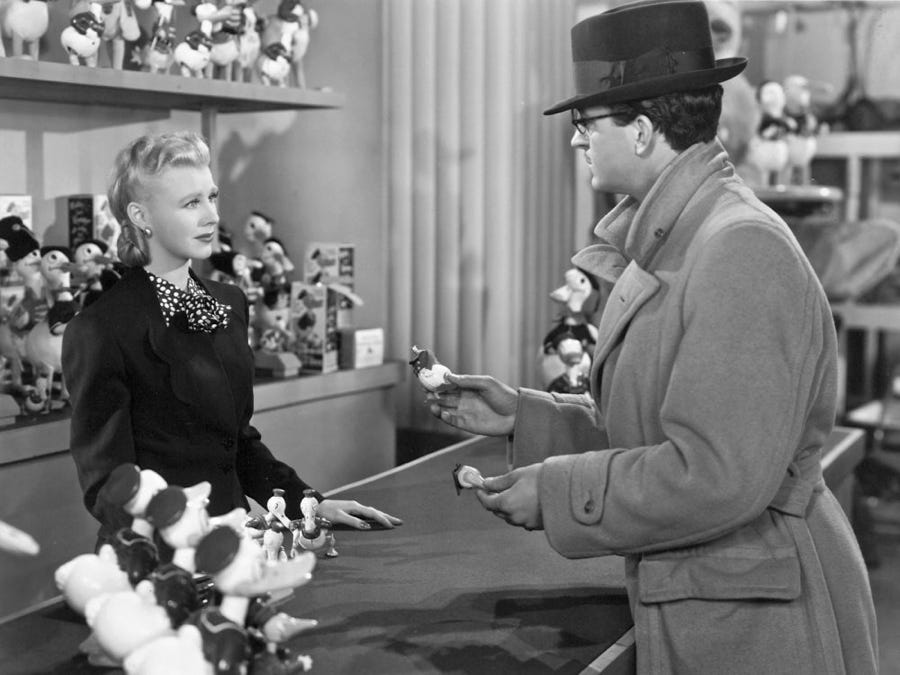
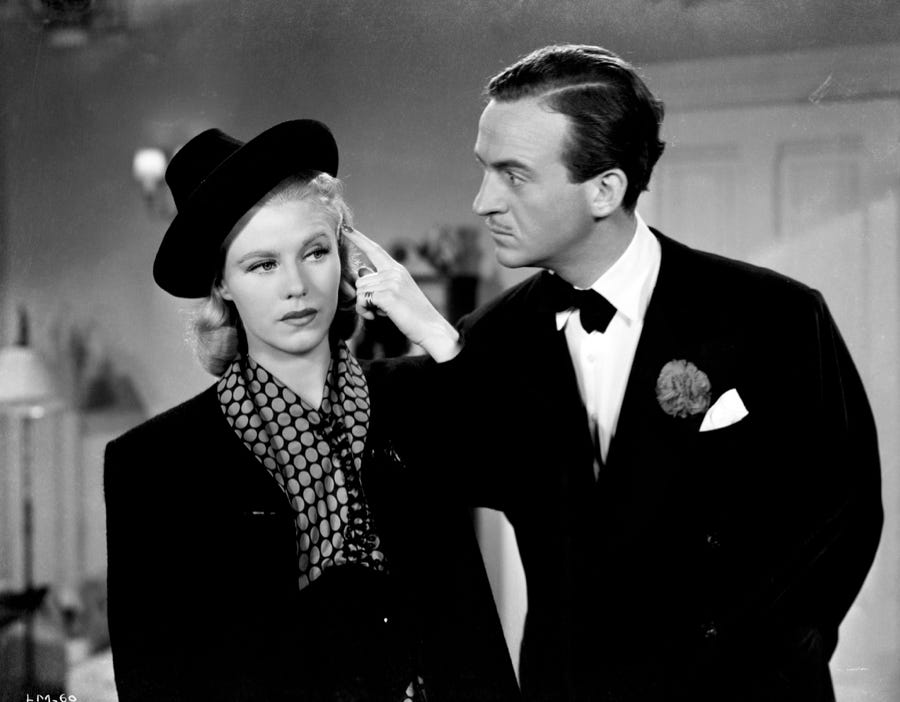
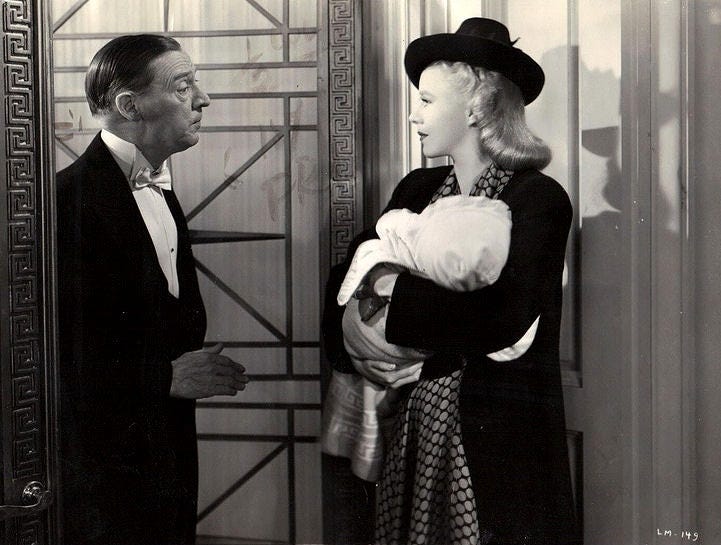
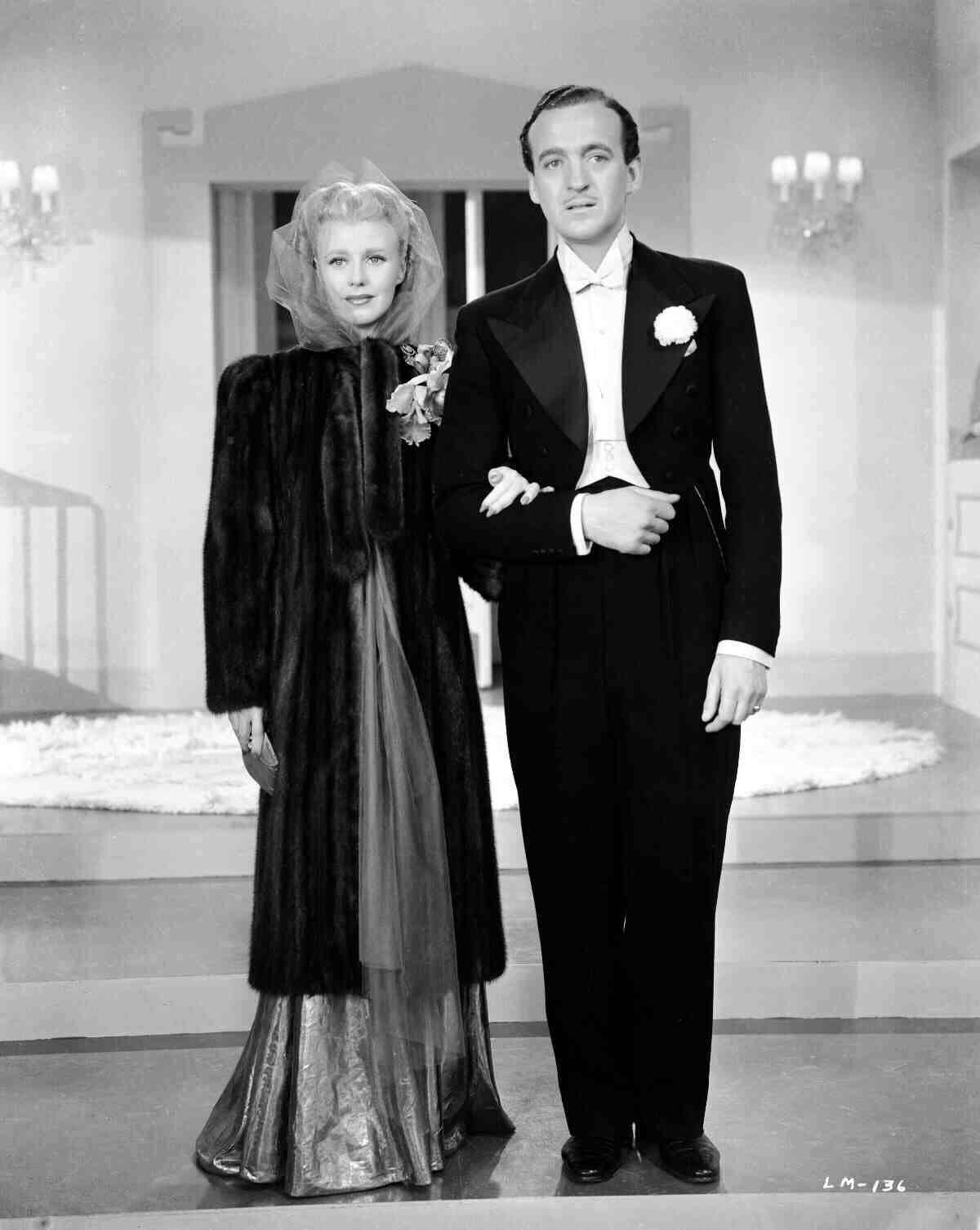
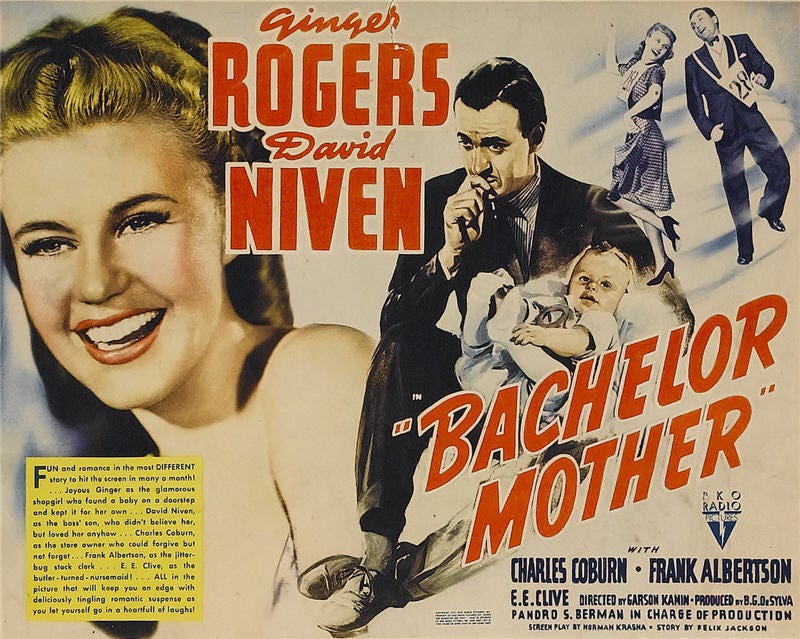
Ah, saw that one not long ago. And yes, Ginger could do a lot more than dance heavenly. Talking about David Niven, I remember enjoying his books/memoirs tremendously. He's incredibly funny and you know he REALLY wrote the books!
Interesting that while the old USA produced its own cowboy role models in abundance its best cinematic examples of the gentlemen seem to be imported - Cary Grant and David Niven. Niven being the more willing raconteur a,so had the benefit of having both war stories and Hollywood stories to regale us with for years.